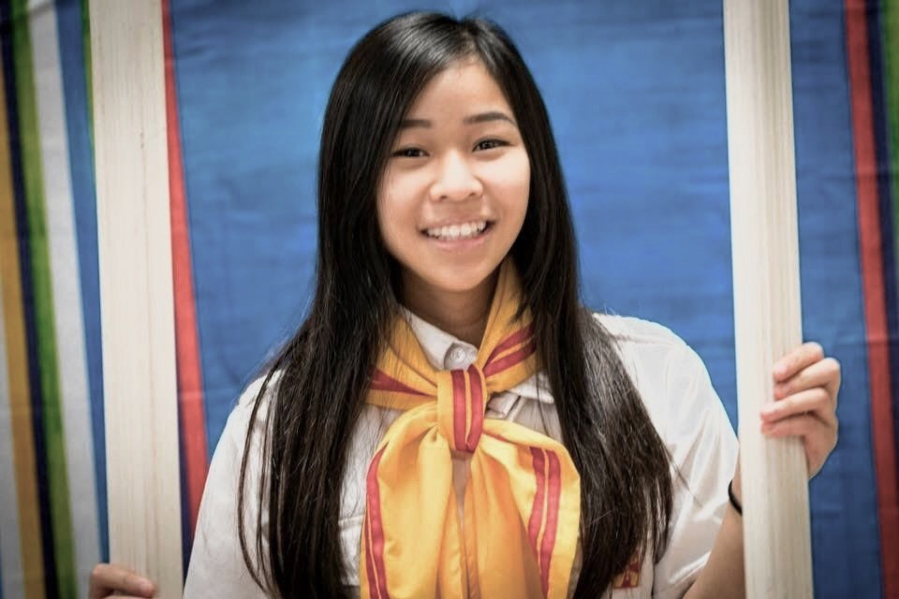In mid-December, after weeks of conjuring up the right emotions and tone of voice, Laney Pham stepped onto the podium at Battle Ground High School to recite a poem. Though the Vietnamese-American student once struggled with English, Pham flawlessly delivered “Personal” by Tony Hoagland. She was awarded first place in the schoolwide poetry competition.
Students nationwide have been doing so for the past 11 years as part of the Poetry Out Loud program. But the competition may soon disappear — along with many others federally-funded humanities program.
President Donald Trump plans to cut $10.5 trillion in federal spending over the next decade. His blueprint, similar to that of the Republican Study Committee, would eliminate funding for the National Endowment for the Arts. It would mean Washington and other states would lose many extracurricular arts programs. Most schools receive support from NEA funds.
“It certainly would cause concern for all different types of programs that provide public access to the arts, and in particular access to arts education, as a part of basic education,” said Lisa Jaret, program manager with the Washington State Arts Commission.
Jaret said that with Poetry Out Loud 95 percent funded by the NEA, she doubts it would continue to be an option in Washington schools after the cuts.
The NEA often gives students the opportunity to further involve themselves in the arts outside of their classes. Organizations such as the Earshot Jazz Society of Seattle, exhibits for the Seattle Art Museum and Poetry Out Loud are just a few programs that provide these creative outlets.
In the fiscal year 2016-2017 alone, Washington state received grants from the NEA for 96 different programs and organizations. Those grants are used to provide engagement to the arts outside of classes.
In the same fiscal year, 3,653 grants were distributed from the NEA to arts programs across the United States.
Poetry, sheet music, paint palettes, along with multiple other art based activities are all important parts of a student’s success and growth, Jaret said. The arts programs are not only pertinent to student development but are required by the state, she said.
Jaret said that $100,000 of the NEA money goes toward arts education grants in Washington state. These funds are used to support the arts as part of the teaching that takes place on a regular school day, since the creative learning style is designed to support a student’s experience, as well as the work they do in school.
“What we’re focused on as a state agency is ensuring, to the extent that we can, that students have arts education as part of basic education,” Jaret said.
Poetry Out Loud
At Battle Ground High School in Clark County, that means having students participate in the Poetry Out Loud program.
It’s a competition where students are encouraged to express themselves and give their own interpretation of poetry by reciting a poem of their choice. After a schoolwide contest, one student per participating school is chosen to advance forward to a regional/state competition. Pham, the Vietnamese student and a junior at BGHS, is headed to Tacoma today for the state competition.
Pham was introduced to the poetry program through an honors English class. She found reciting poetry to be a new concept for her, since her first language is Vietnamese. Pham said that she’s always had a barrier holding her back from fully expressing her thoughts and feelings in English.
“My language barrier developed into a drawback that stunted my social development, which led me to look for activities that would help with my language and speech skills,” Pham said. “Poetry Out Loud has helped me in developing language speech skills, as well as delivering my feelings through an art form.”
Through Poetry Out Loud, Pham said she has found a chance to engage her passions and reach the emotions of those she’s never met before. She said that she feels many others who participate in the poetry program and similar programs are able to take away the same accomplishments.
Heather Smithline, one of Pham’s former English teachers at BGHS, incorporates the NEA-funded poetry program into her curriculum every year. Smithline chooses to include it because it requires the act of memorizing and recognizing an in-depth vocabulary.
“It’s language in a different way, language in a way that we don’t normally consume it, and I think that it makes you see things differently,” Smithline said.
She said poetry helps students to activate different parts of their brains.
“It’s important, I think, to expose people to beauty. It’s part of being human,” Smithline said.
When Smithline asks her students at the end of the year what they feel they learned the most from, a quarter of the students often respond with the poetry program. The students explain how they never thought they could achieve something like memorizing and emotionally reciting a poem to a classroom full of people.
Not only does Smithline use Poetry Out Loud in her teaching, but she also incorporates a variety of other sources provided by the NEA, such as podcasts.
It is still uncertain whether or not President Trump and Congress will cut NEA funding.
Though there will be a lack of public access, the arts are still a significant aspect of students’ education. Because of this, Jaret mentioned that many organizations would continue to advocate for them. They include the Arts Education Partnership and Americans for the Arts.
In the midst of the debate, Jaret said, it’s important to remember “the instinct to be creative is human.” Whether or not the cuts are made, and access to art outlets is lost, “people will still be creative, people will still make things,” Jaret said.
Ainslie Cromar is a journalism student at Clark College. This story was written as part of a collaboration with The Columbian called Voices From Clark College.



